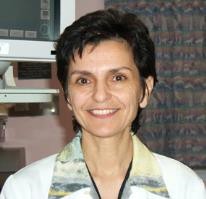

 Associate Professor of Pediatrics
Associate Professor of PediatricsEmail:
Address:
Department of Pediatrics
Basic Science Building, Room A12
Valhalla, NY 10595
Professional Interests:
Our long standing interests involve the molecular mechanisms mediating the adaptive (and maladaptive) responses to different types of stress as relates to altered expression of neurotransmitter genes in the central and peripheral nervous systems. Current research projects are aimed to test the hypothesis that early pre/postnatal gut colonization can augment the maturation and function of sympathoadrenal responses to classic stressors during development, providing an evolutionarily preserved survival advantage in neonates (rodents as well as humans). Preliminary results provided a proof of concept that counter-regulatory responses to acute insulin induced hypoglycemia and adrenal catecholamine homeostasis are affected in mice lacking microbiome (germ free). Our alternative strategy is to employ antibiotics-induced gut dysbiosis combined with/or without concurrent mono/ whole gut bacterial recolonization or supplementation with bacterial metabolites. That would make the animal model more relevant to the human situation (poor neurodevelopmental outcomes following antibiotic therapy in pregnant moms and pre-term/term babies in early postnatal life). In addition, our novel approach is to study gut-microbiota-brain interface at individual synapse - the excitatory preganglionic-adrenal chromaffin cell synapse, the final step in the multi-neuronal signaling pathway(s) that results in release of epinephrine. It represents an easily accessible peripheral model of central catecholaminergic neurons and allows for manipulation of transsynaptic and hormonal signaling that may be influenced by chemical messages arising from acquired microbial symbionts at birth, as well as a reliable and robust outcome measure.
Educational Profile:
Graduate Degree: M.Sc., PhD in Molecular Biology
Graduate Degree Institution: Institute of Molecular Biology, Bulgarian Academy of Sciences
Undergraduate Institution: Sofia State University, Sofia, Bulgaria
Selected Bibliography:
Giri P, Hu F, La Gamma EF, Nankova BB “Absence of Gut Microbial Colonization Attenuates the Sympathoadrenal Response to Hypoglycemic Stress in Mice: Implications for Human Neonates” Ped. Res. 2018 submitted (in press?).
Frye RE, Nankova B, Bhattacharyya S, Rose S, Bennuri SC, MacFabe DF “Modulation of Immunological Pathways in Autistic and Neurotypical Lymphoblastoid Cell Lines by the Enteric Microbiome Metabolite Propionic Acid” Front Immunol. 2017 Dec 22; 8:1670. doi: 10.3389/fimmu.2017.01670. PMID: 29312285
Kim JL, La Gamma EF, Estabrook T, Kudrick N, Nankova BB “Whole genome expression profiling associates activation of unfolded protein response with impaired production and release of epinephrine after recurrent hypoglycemia” PloS ONE 2017 12(2):e0172789. PMID: 28234964
Kudrick N, Chan O, LaGamma EF, Kim, JL, Tank AW, Sterling C, Nankova, BB “Posttranscriptional regulation of adrenal TH gene expression contributes to the maladaptive responses triggered by insulin-induced recurrent hypoglycemia” Physiol Rep, 3(2), 2015, e12307, doi: 10.14814/phy2.12307.
LaGamma EF, Kirtok N, Chan O, Nankova BB. Partial blockage of nicotinic acetylcholine receptors improves the counterregulatory response to hypoglycemic rats. Am J Physiol Endocrinol Metab. 2014, 303(7):E580-8. PMID: 25117409
Nankova BB, Agarwal R, MacFabe D, LaGamma EF. Enteric bacterial metabolites propionic and butyric acid modulate gene expression, including CREB-dependent catecholaminergic neurotransmission, in PC12 cells – possible relevance to autism spectrum disorders. PloS ONE 2014; 9(8):e103740. PMID: 24346111
Turcanu DS, Kirtok N, Eibl C, Guendisch D, LaGamma EF, Nankova BB. Nicotinic receptor partial agonists alter catecholamine homeostasis and response to nicotine in PC12 cells. Neuroscience Letters 2012; 516(2):212-6.